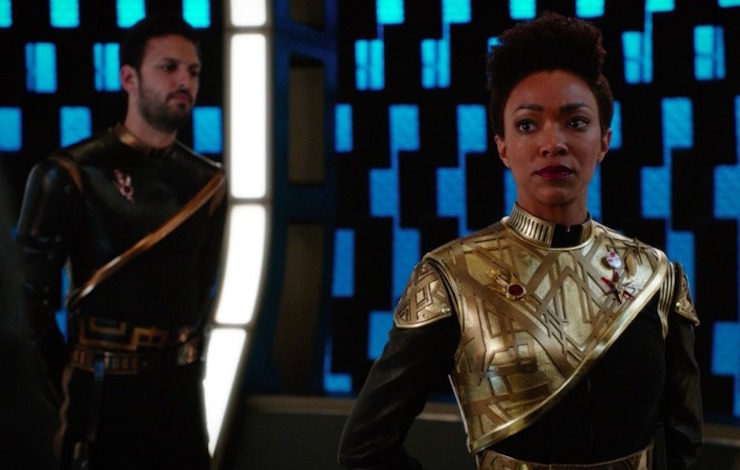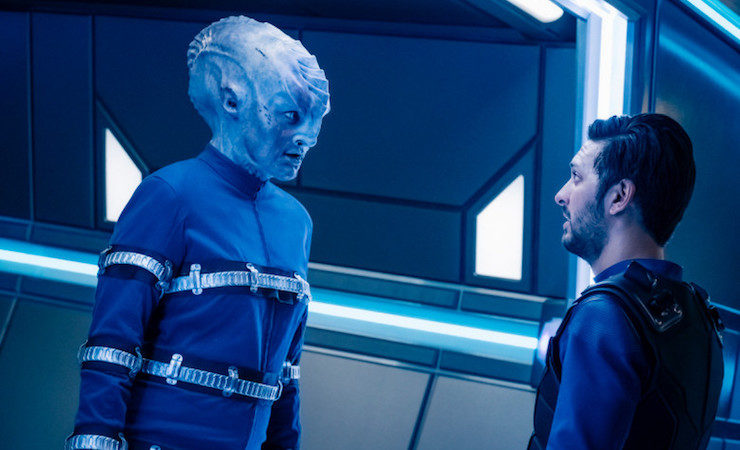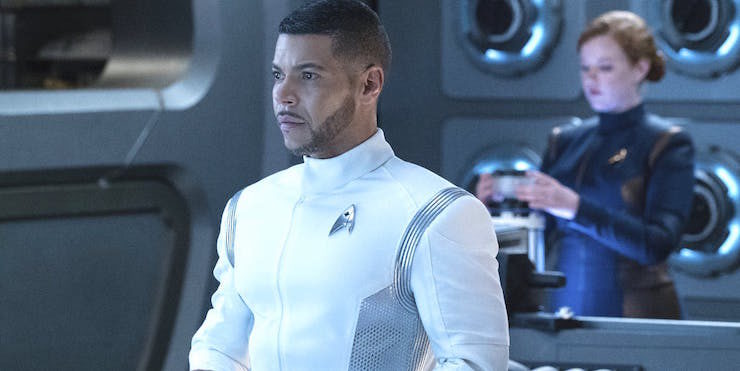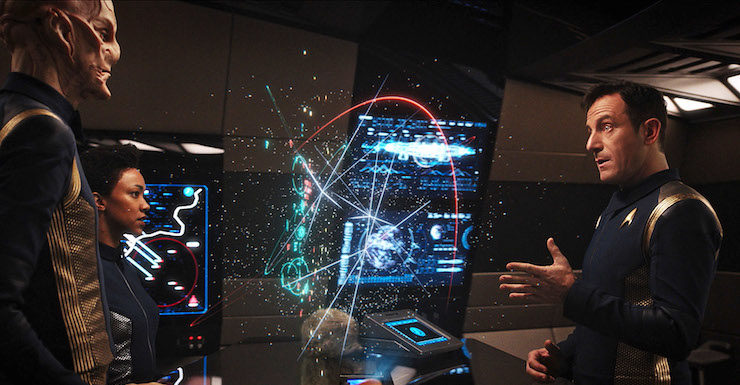After a two-month wait, Star Trek Discovery returns with new episodes and answers several questions while asking three or four more, and also, sadly, providing us with a TV Trope that I’m not entirely sure Trek needed to participate in.
The big thing, though, is that we’re back in the Mirror Universe, making Discovery the fourth series to visit that particular alternate timeline established in 1967’s “Mirror, Mirror” on the original series, and the ninth single episode to deal with the MU. And since Discovery is still in the MU at episode’s end, and the previews include Sarek with a goatee, then we’re guaranteed to hit double digits in MU Trek episodes in a week’s time. Yay?
The episode opens by establishing that Discovery isn’t actually lost in space, as I feared at the end of “Into the Forest I Go,” but rather in the right place in the wrong universe. They’re at the coordinates intended, but there’s no starbase, and there is a graveyard of ships.
They soon learn that the ships are crewed by Vulcan, Andorian, and Klingon rebels against the Terran Empire, as first seen in “Mirror, Mirror.” Lorca realizes that they need to assimilate into this universe and blend in until they can figure out a way home so they can get their intel about the Klingon cloaking device to Starfleet to win the war. Stamets is in no shape to run the spore drive again, so they need to find an alternative.
To episode writer Sean Cochran’s credit, this episode makes good use of all the past MU episodes, as well as another episode that was all about many-universes theory, “Parallels” on The Next Generation. Saru determines that they’re in another universe by the quantum signature of the matter around them (also how they did it in “Parallels” with Worf), and it is the discovery (ahem) in the records of one of the derelict rebel ships that they learn of their universe’s U.S.S. Defiant that somehow wound up in this universe’s past (as established in TOS’s “The Tholian Web” and Enterprise’s “In a Mirror, Darkly” two-parter). On top of that, the episode uses the plot device from Deep Space Nine of our star disguising herself as her dead MU counterpart—Sisko in “Through the Looking Glass” and “Shattered Mirror,” Burnham here. And we get all the usual Terran Empire stuff from “Mirror, Mirror,” including the salute, ascension by assassination, and the agony booths. (Though instead of uniforms that reveal more skin, we instead get uniforms that are better armored, thus retroactively making the MU Starfleet smarter than the mainline one…)

Lorca even is kind enough to lampshade the structural absurdity of the MU, as it makes no sense scientifically that a universe that is so much different would have the same people in it mostly arranged in the same manner as they are in the mainline universe. I have to confess to really enjoying Lorca saying to Burnham, “Geez, that’s really weird,” and then moving on.
One of the themes of “Mirror, Mirror” was spoken by Spock at the end: it is easier for a civilized person to pretend to be a barbarian than the other way ’round, and we get two entertaining examples of it here. Burnham is scarily effective as Captain Burnham of the I.S.S. Shenzhou, but that’s as nothing compared to the perverse delight of Cadet Tilly pretending to be Captain Tilly—or, rather, the deliberately unimaginatively nicknamed “Captain Killy”—of the I.S.S. Discovery. The line about cutting out tongues and using them to lick her boots was epic, and I must confess that the thing I’m most looking forward to next week is more of Captain Killy. (They also establish that, just as in “Mirror, Mirror,” the two Discoverys switched places, and I wonder if, unlike the TOS episode, we’ll actually see the I.S.S. Discovery in depth in the mainline universe.)
The fun of MU episodes is getting to see the characters we know and love in different situations, though there hasn’t been much of that yet, beyond the play-acting. The only people we see actual MU counterparts of are Connor and Detmer, who are minor bridge characters (though it was cool seeing an unscarred Detmer on the I.S.S. Shenzhou bridge when Burnham had just left the mainline one on Discovery’s bridge). But, as I discussed when going through DS9’s MU forays, particularly “The Emperor’s New Cloak,” once the novelty wears off, there isn’t a lot of there there, and the fact that this seems to be a multipart storyline is irritating.
The other big reveal is that, yes, Tyler is really Voq. Unfortunately, something’s gone wrong with the conditioning. L’Rell says the key phrase that will restore Voq’s personality—a prayer to Kahless—but it doesn’t work. At least not entirely. Tyler blacks out periodically, but he doesn’t revert to Voq as L’Rell expects, though the conditioning is there enough to protect himself from being discovered.

That latter is the big elephant in the room, as Tyler kills Culber to keep Culber from removing him from duty.
On the one hand, this is a very effective character death, because Culber is someone we care about, and Tyler—even if it’s an artificial personality overlaid over Voq’s—is also someone we care about, and the latter kills the former in order to protect the secrets of the real personality under Tyler’s. Like the death of Georgiou—which has hung over every episode like a shroud—and unlike the death of Landry—who was redshirted after being established as unlikeable anyhow, so who really cares, which is entirely the wrong way to do this—Culber’s death packs an emotional wallop.
On the other hand, does television really need another LGBT character to be fridged? Removed from the context of the rest of television, this is a powerful and effective scene, one that had me and my wife both literally gasping out loud in shock and anguish. Leaving aside any other considerations, Culber is a fun, interesting, likeable character whom it was fun to get to know. And now we won’t get to. Plus, having him be a victim of Tyler makes sense because, as a doctor, he’s in the best position to expose Voq.
But can one entirely remove it from the context of the rest of television? Hell, Discovery’s storytelling mode is very much dictated by the rest of television, as it’s very much Trek as a 2010s TV show. Unfortunately, the 2010s are littered with LGBT corpses, and it grows wearisome.
Because Discovery is a 2010s TV show, of course, we don’t have the whole story yet. These reviews of mine have been full of complaints and speculations and criticisms that have turned out to be unfounded because of what was revealed later, and most of those revelations have been good ones, so I’m willing to give a conditional benefit of the doubt, especially given my own conflicted feelings about Culber’s death. (It really was incredibly effective from a storytelling perspective. But Jesus fuck, people, really?)

Having said all that, most of my issues with the episode were ones I didn’t even really start thinking about until after it was over. While I was watching it, I was completely absorbed, to the point that I was stunned to realize the episode was almost over when Burnham killed Connor. Ever since he cut his teeth going behind the camera on TNG, I have found Jonathan Frakes to be one of the finest television directors extant, and his superlative career since then has only solidified this opinion (he’s currently an executive producer and regular director on The Librarians). This definitely goes in the upper echelon of his Trek directing work, along with “Reunion” and “Cause and Effect.”
Now we just have to see where this goes……
Since he last reviewed a Discovery episode, Keith R.A. DeCandido has started a Patreon, where he’s providing a bunch of different things, including monthly movie reviews (Star Wars: The Last Jedi), weekly TV reviews (Marvel’s Agents of S.H.I.E.L.D., MacGyver, The Librarians, and Doctor Who‘s Christmas Special), excerpts from his works in progress (currently his urban fantasy novel A Furnace Sealed), monthly vignettes featuring his original characters (a holiday bit featuring Cassie Zukav, weirdness magnet), and tons and tons of cat pictures, with more to come. Do check it out!










